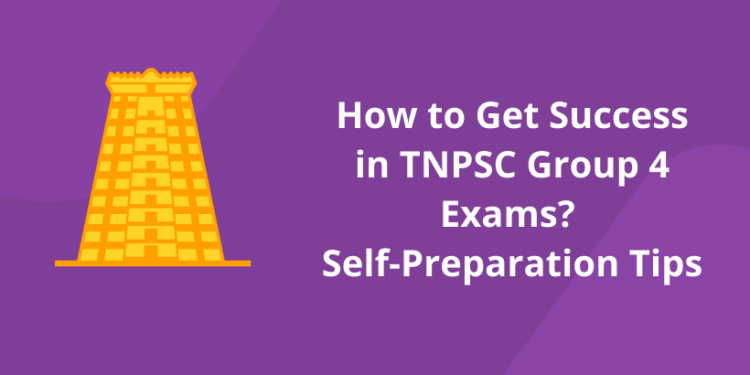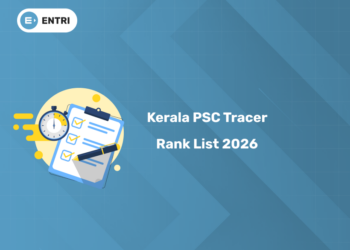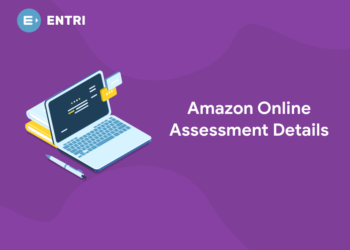Table of Contents
The Tamil Nadu Public Service Commission will be conducting the Combined Civil Services Examination-IV (CCSE Group-IV) on 24th July 2022. The admit card for the CCSE Group IV examination has been released by TNPSC on its official website. As per the advertisement number 07/22, the written examination is conducted for Group IV posts which includes Jr Assistant, VAO, Bill Collector, Typist Etc. to fill 7301 vacancies.
Candidates who have successfully registered and applied for the CCSE Group-IV selection shall speed up their preparations with a few days left for the examination. The following article provides details on the TNPSC Group 4 2022 syllabus, exam pattern, books for preparation and self-preparation tips.
Competitive Exams? Learn with Entri App!
TNPSC Group 4 2022: Self-Preparation Tips
The subjects to be studied for the TNPSC Group 4 2022 examination are General Science, Current Events, Geography, History and Culture of India, Indian Polity, Indian Economy, Indian National Movements, History, Culture, Heritage and Socio-Political Movements of Tamil Nadu, Development Administration in Tamil Nadu and Aptitude & Mental Ability Tests.
Preparation should completely be based on the pattern of examination and syllabus the examination board has provided. While preparing, try to focus on gaining an in-depth conceptual understanding for each subject. Manage your time by attempting the easy questions first. Candidates will receive proper guidance from The right study materials and resources will guide the student on the right track and it serves the purpose of covering all the important topics under each subject. Students will have to meet the selection process requirements of the TNPSC Group 4 Examination to qualify. Hence, the candidate must revise the portions thoroughly to be able to manage time and answer each section. Remember to Carry a valid ID proof (Aadhar/PAN) along with your Admit Card before entering the examination hall.
Given below are tips on self-preparation that would guide candidates in setting a strategic approach to their preparation:
- Create a study plan aligns to your convenience yet helps you cover the important topics.
- Periodicals on competitive examinations and current affairs will give a glimpse of the recent updates. Refer recommended books (provided in the article) that include the subjects of English, General/Banking Awareness, Computer Awareness, Reasoning, and Quantitative Aptitude. The syllabus for the TNPSC Group 4 examination is provided below in the article.
- Skim through daily current affairs through newspapers like The Hindu and Indian Express.
- Based on the pattern of examination of TNPSC Group 4 (provided in the article), each section has to be divided while studying which gives clarity on the relevant topics.
- Practice regularly to answer by the question pattern, using previous year’s question papers and mock tests.
- According to your level of ease and preparation, work on placing your attention and time on each section.
Read more on ‘How to Download TNPSC CCSE Group 4 Exam Admit Card‘ here.
TNPSC Group 4: Books for Preparation
Referring and learning from the best books and study materials is important for candidates while preparing for a competitive exam to focus on the topics to be covered, answering pattern and most importantly to save time by placing emphasis only on the necessary portions. Begin your preparations for the TNPSC Group 4 Exam 2022 with the books best for reference provided here. Do let us know in the comment section of this article about books we have missed to recommend and cracking this exam is a goal could be easily made possible by availing the right material. Get the TNPSC Group 4 exam preparation books here.
| Subject | Books – Author/Publisher |
| History |
|
| Indian Polity |
|
| Indian Economy | Indian Economy for Civil Services Examination – Ramesh Singh |
| Geography |
|
| Aptitude |
|
Other sources for preparation:
| Name of the Books | Author-Publisher |
| TNPSC Group – IV Previous year Original Question Paper | TNPSC- Panel of Experts |
| TNPSC GROUP IV exam All-in-One Complete Study Material Book & Solved Question Paper | V.V.K Subburaj -Sura College of Competition |
| Manual for TNPSC Examinations (General Studies) | M. Karthikeyan -McGraw Hill Publications |
| Quantitative aptitude for competitive examinations | R.S Agarwal.-S. Chand Publications |
| General Knowledge 2020 | Arihant Experts-Arihant Publications |
Ace your exam preparation. Download Entri Learning App!
TNPSC Group 4 2022: Exam Pattern
The exam pattern for the examinations conducted under Group 4 by the TNPSC is provided in detail in the table given below:
| Subject | Duration | Minimum Qualifying Marks for all communities | Maximum Marks |
| SINGLE PAPER
(Objective Type) Part-A Tamil Eligibility-cum-Scoring Test* (SSLC Standard) (100 Questions / 150 marks) Part-B General Studies (SSLC Standard) (75 Questions) with Aptitude & Mental Ability Test (SSLC Standard) (25 Questions) (100 Questions / 150 marks) Total – 200 Questions |
3 Hours |
90 |
300 |
TNPSC Group 4 2022: Syllabus
The syllabus for the examinations conducted under Group 4 by the TNPSC is provided in detail in the table given below:
Download the TNPSC Group 4 Exam Pattern and Syllabus PDF here.
| No. | Subject | Syllabus |
| 1 | General Science | i. Nature of Universe – Measurement of Physical Quantities – General
Scientific Laws in Motion – Force, Pressure and Energy – Everyday application of the basic principles of Mechanics, Electricity, Magnetism, Light, Sound, Heat and Nuclear Physics in our daily life. ii. Elements and Compounds, Acids, Bases, Salts, Petroleum Products, Fertilizers, Pesticides, Metallurgy and Food Adulterants. iii. Main concepts of Life Science, Classification of living organisms, Evolution, Genetics, Physiology, Nutrition, Health and Hygiene, Human diseases. iv. Environmental Science. |
| 2 | Current Events | i. Latest diary of events – National symbols – Profile of states –
Eminent personalities and places in news – Sports – Books and Authors. ii. Welfare Scheme of Government – Political parties and Political system in Tamil Nadu and India. iii. Latest inventions in Science and Technology – Geographical Landmarks – Current Socio – Economic issues. |
| 3 | Geography | i. Earth Location – Physical Features – Monsoon, rainfall, weather and climate – Water resources – Rivers – Soil, Minerals and Natural resources – Forest and Wildlife – Agriculture pattern.
ii. Transport – Communication. iii. Population density and distribution in Tamil Nadu and India. iv. Calamities – Disaster Management – Environment – Climate change. |
| 4 | History and Culture of India | i. Indus valley civilization – Guptas, Delhi Sultans, Mughals and
Marathas – South Indian History. ii. Characteristics of Indian culture, Unity in diversity – Race, Language, Custom. iii. India as a Secular State. |
| 5 | Indian Polity | i. Constitution of India – Preamble to the Constitution – Salient
Features of the Constitution – Union, State and Union Territory. ii. Citizenship, Fundamental Rights, Fundamental Duties, Directive Principles of State Policy. iii. Union Executive, Union Legislature – State Executive, State Legislature – Local Governments, Panchayat Raj. iv. Spirit of Federalism: Centre – State Relationships. v. Election – Judiciary in India – Rule of Law. vi. Corruption in public life – Anti-Corruption measures – Lokpal and Lokayukta – Right to Information – Empowerment of Women –Consumer Protection Forums – Human Rights Charter. |
| 6 | Indian Economy | i. Nature of Indian economy – Five year plan models – an
assessment – Planning Commission and Niti Ayog. ii. Sources of revenue – Reserve Bank of India – Finance Commission – Resource sharing between Union and State Governments – Goods and Services Tax. iii. Economic Trends – Employment Generation, Land Reforms and Agriculture – Application of Science and Technology in Agriculture– Industrial growth – Rural Welfare oriented programmes – Social Problems – population, education, health, employment, poverty. |
| 7 | Indian National Movements | i. National Renaissance – Early uprising against British rule – Indian National Congress – Emergence of leaders -B.R.Ambedkar, Bhagat Singh, Bharathiar, V.O.Chidambaranar, Jawaharlal Nehru, Kamarajar, Mahatma Gandhi, Maulana Abul Kalam Azad, Rajaji, Subhash Chandra Bose, Muthulaksmi Ammaiyar, Muvalur Ramamirtham and Other National Leaders.
ii. Different modes of Agitation of Tamil Nadu and movements. |
| 8 | History, Culture, Heritage and Socio-Political Movements of Tamil Nadu | i. History of Tamil Society, related Archaeological discoveries, Tamil
Literature from Sangam age till contemporary times. ii. Thirukkural : a) Significance as a Secular Literature. b) Relevance to Everyday Life. c) Impact of Thirukkural on Humanity. d) Thirukkural and Universal Values – Equality, Humanism etc. e) Relevance to Socio – Politico – Economic affairs. f) Philosophical content in Thirukkural. iii. Role of Tamil Nadu in freedom struggle – Early agitations against British Rule – Role of women in freedom struggle. iv. Various Social reformers, Social reform movements and Social transformation of Tamil Nadu. |
| 9 | Development Administration in Tamil Nadu | i. Social Justice and Social Harmony as the Cornerstones of Socio –
Economic development. ii. Education and Health systems in Tamil Nadu. iii. Geography of Tamil Nadu and its impact on Economic growth. |
| 10 | Aptitude & Mental Ability Tests | i. Simplification – Percentage – Highest Common Factor (HCF) –
Lowest Common Multiple (LCM). ii. Ratio and Proportion. iii. Simple Interest – Compound Interest – Area – Volume – Time and Work. iv. Logical Reasoning – Puzzles – Dice – Visual Reasoning – Alpha Numeric Reasoning – Number Series. |
Eligibility Tests? Crack with Entri Learning App!
Aiming for high marks and saving time can be achieved once the candidate takes up the right study material for their exam preparation. ENTRI APP provides mock tests, learning tools, study materials, and quizzes that will guide you through a thorough comprehension of the relevant topics as well as help you become confident in scoring well for your examination.










